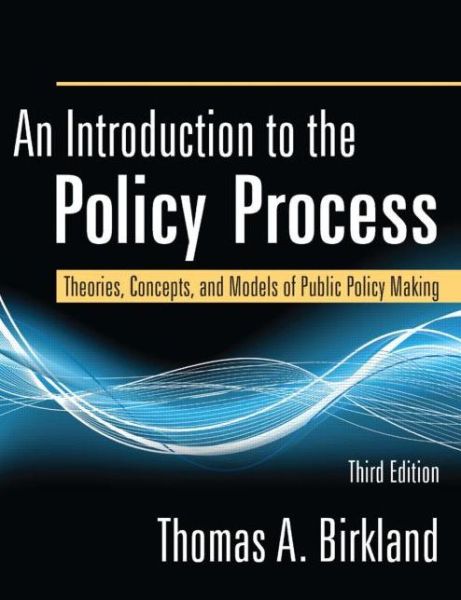An Introduction to the Policy Process: Theories, Concepts, and Models of Public Policy Making pdf
Par williams sonia le dimanche, octobre 11 2015, 23:01 - Lien permanent
An Introduction to the Policy Process: Theories, Concepts, and Models of Public Policy Making by Thomas Birkland


Download eBook
An Introduction to the Policy Process: Theories, Concepts, and Models of Public Policy Making Thomas Birkland ebook
Format: pdf
ISBN: 9780765625328
Publisher: Sharpe, M. E. Inc.
Page: 368
5.1 What is the purpose of an economic model? Nov 1, 2013 - The combination of multiple theories in policy studies is like a valence issue in politics: few would disagree with the idea, largely because the sentiment is rather vague. Universal laws or even predictive theories of policy are not possible because those who seek to understand the policy process are inextricably part of that process. Feb 14, 2014 - To achieve the ambition of the energy transition in the built environment, Dutch local governments try to motivate citizens to participate as communities in policy processes. Mar 27, 2013 - There are three main systems that dominate policy-making – the rational actor model; the organizational model; and the bureaucratic model. 3.2 Language and communication. As such, we need to consider that these models not only express shared beliefs or values concerning the place of government but inescapably also relate to the relevance of markets and networks in a public governance perspective. The concept of ecosystem goods and services (EGS) provides a framework to analyze relationships between society and ecology in complex social-ecological systems (Reyers et al. 5 The use of economic models in policy-making. Ecosystem goods and services (EGS) studies have had little impact on policy processes and real-world decision-making due to limited understanding of the interactions and feedbacks among ecological, social and economic processes. 5.2 Are DSGE models really structural? May 15, 2008 - theory of policy-making. 5.3 Can DSGE models be identified and estimated? 3 Research and policy work: how different are they? In this framework, research and research ideas become influential on policy as a result of their being incorporated and used by competing advocacy coalitions. Xavier IJ (2005) Analytics of the modern: an introduction. Thus, the model introduces notions of power and competition researchers do not sit above and apart from the process of making policy. 2 The views of central bankers.